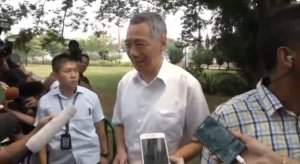
(Reuters) — Singapore’s Prime Minister Lee Hsien Loong on Friday (September 11) cast his vote in its most hotly-contested general election to date, even though the ruling party is bound to win.
Lee, who voted in a constituency in the south of the city with his wife, Ho Ching, said he was confident.
“I feel good thank you, I’ve cast my vote, I’ve visited my polling stations in Ang Moh Kio and this evening I’ll be looking at the results,” he said.
When asked whether was worried about the results, he replied, “We always watch carefully. We’ve done our best.”
He was also asked what he saw for the future of Singapore.
“That’s for Singaporeans to choose and that’s what this election is about,” he said.
“I think we have had some impact, of course we’d like people to listen and absorb more always but I think we’ve got our messages across,” he added.
The PAP, which has ruled since independence, has a bedrock of support and will win the bulk of parliament’s seats but opposition inroads would challenge its dominance.
The PAP’s share of the vote dropped to 60.1 percent in the last election, in 2011, its lowest ever. Nevertheless, it held 79 of a total 87 seats in the outgoing parliament.
Years of strong growth have turned the island nation into an international financial hub with spotless streets and malls, well-tended parks and living standards unmatched in Southeast Asia.
But that success and an influx of foreign workers have brought high property prices, crowded public transport, and a widening wealth gap which have fueled resentment among many in a city that surveys rank as one of the world’s most expensive.
Opposition parties are hoping to take advantage of the grumbling and are contesting all 89 seats in parliament for the first time since independence in 1965.
The opposition has focused its campaign on the bread-and-butter issues of jobs, healthcare and housing. Preliminary results are expected from a couple of hours after the polls close at 8 p.m. (1200 GMT).
Voting is compulsory for almost 2.5 million eligible voters.







